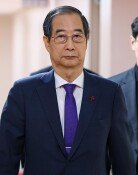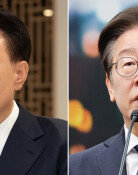‘Trump variable’ likely to affect trilateral cooperation
‘Trump variable’ likely to affect trilateral cooperation
Posted December. 15, 2023 08:09,
Updated December. 15, 2023 08:09
In diplomatic and security policies, the trilateral cooperation among South Korea, the United States, and Japan stands out as a key focus and achievement for the Yoon Suk Yeol administration. President Yoon has visited the United States four times this year alone and engaged in seven summit meetings with Japanese Prime Minister Fumio Kishida. The August Camp David summit is hailed as a significant upgrade in the trilateral cooperation among the leaders of South Korea, the United States, and Japan.
A recent opportunity to participate in the "Korea-Japan Joint Press Corps," hosted by the U.S. Embassy in Seoul, allowed this reporter to meet with various U.S. government officials, members of Congress, think tank representatives, and more in Washington. When asked about potential future variables that could impact South Korea-U.S.-Japan cooperation, their opinions were centered around a recurring theme: the “Trump variable,” beating conventional expectations of discussions on historical issues, North Korean nuclear threats, or North-China-Russia coordination. The consensus was that the re-emergence of former President Donald Trump as a political force, with his higher approval ratings than President Joe Biden in the lead-up to the November 2023 U.S. presidential election, could be a crucial factor affecting trilateral cooperation.
U.S. officials generally believe that Trump's return would not fundamentally shake the foundations of South Korea-U.S.-Japan cooperation. Ambassador Rahm Emanuel said, "Regardless of changes in the results of next year's South Korean elections or the U.S. presidential election, the overall framework of trilateral cooperation will likely remain intact." Senator Bill Hagerty, who served as U.S. Ambassador to Japan during the Trump administration, emphasized that Trump intends to continue cooperation among the three countries.
However, many acknowledge that the direction and pace of trilateral cooperation, as established by the current leaders of South Korea, the United States, and Japan, may undergo some adjustments during a Trump presidency. Some U.S. officials raised the possibility that Trump, upon returning to the White House, might scrutinize and potentially modify specific aspects of the South Korea-U.S.-Japan cooperation outlined by the Biden administration, adding conditions or putting a brake on some of the progress made so far. Concerns have been raised about the potential impact of Trump's approach on the policy coordination established for North Korea-related initiatives, which served as a framework of trilateral cooperation this year, considering reports suggesting Trump is contemplating a policy shift towards accepting North Korea's possession of nuclear weapons as part of a potential "deal."
Prior to the political uncertainty introduced by the U.S. presidential election, discussions arose on stabilizing South Korea-U.S.-Japan cooperation. U.S. officials highlighted the importance of "institutionalization." Similar to the establishment of the Nuclear Consultative Group (NCG) by Seoul and Washington, the officials proposed creating institutional frameworks beyond declarative cooperation, encompassing operational mechanisms for immediate implementation.
There is also a call to broaden the scope of institutionalization. Beyond the current focus on security and economic cooperation, they call for establishing a multi-layered institutional network covering cybersecurity, space exploration, environment, energy, and even cutting-edge technologies like quantum computing.
Amid concerns about the "Trump variable," some have advised leveraging the "China variable." Anticipating a tough stance on China from both Biden and Trump, it is emphasized that South Korea, the United States, and Japan must establish a clear cooperative framework at all levels, from high-level diplomacy to practical collaboration, on issues ranging from security and supply chain resilience to addressing challenges related to China including countering disinformation.







